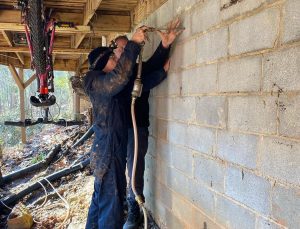
Nobody wants pests in their home, but here’s something most people don’t realize—those unwanted guests aren’t just creepy; they can also mess with your indoor air quality.
Cockroach droppings, rodent dander, and even the carcasses of dead insects can break down into tiny particles that float in the air, triggering allergies, asthma, and other respiratory issues. The best way to keep these invisible pollutants at bay? Regular pest control. Monthly treatments don’t just prevent infestations; they also help maintain cleaner, healthier air inside your home.
By keeping pests out, you’re reducing allergens and airborne contaminants that could be affecting your family’s health every day. It’s an unexpected but powerful benefit of routine pest control.
How does monthly pest control impact indoor air quality?
Monthly pest control is important in improving indoor air quality by addressing several factors affecting the air we breathe. Here’s how it impacts your environment:
- Reduction of Allergens: Pests like cockroaches, rodents, and dust mites leave behind droppings, urine, and shed skin, contributing to poor indoor air quality. These allergens can trigger asthma, allergies, and other respiratory issues. Monthly pest control helps prevent the buildup of these harmful particles.
- Prevention of Mold and Mildew: Pests such as termites, rodents, and ants can introduce moisture into walls, basements, or other hidden areas, promoting mold and mildew growth. Mold spores released into the air can irritate the lungs and worsen conditions like asthma. Pest control can minimize pest-induced moisture issues, keeping mold growth at bay.
- Elimination of Pest Habitats: Pests often seek shelter in warm, damp areas of the home where dust and debris accumulate, contributing to poor air quality. Monthly pest control treatments target and remove these nests, helping to keep these areas cleaner and less likely to harbor airborne contaminants.
- Reduced Pest-Related Odors: Some pests, like rodents, produce unpleasant odors that can infiltrate the air. Consistent pest control prevents the buildup of such smells, improving the overall air quality in the home.
Regular pest control treatments can significantly reduce airborne contaminants, promoting healthier indoor air and a safer living space.
What are the hidden effects of pest infestations on air quality?
Pest infestations can have several hidden effects on indoor air quality, many of which go unnoticed until health issues arise. Here’s how pests impact the air in your home:
- Increased Allergens: Pests like cockroaches, rodents, and dust mites leave behind droppings, urine, and dead body parts, all of which can become airborne and contribute to poor air quality. These allergens are potent triggers for asthma, allergies, and other respiratory conditions, especially for sensitive individuals.
- Mold and Mildew Growth: Some pests, such as termites, rodents, and ants, can introduce moisture into walls or other hidden areas in your home, creating an environment conducive to mold and mildew growth. Mold spores can be released into the air, causing respiratory issues like coughing, wheezing, and sinus congestion.
- Odors and Contaminants: Pests like rodents often leave behind urine or feces, which can emit strong, unpleasant odors that linger in the air. These odors can negatively affect indoor air quality and further contaminate surfaces and ventilation systems.
- Bacteria and Viruses: Certain pests, like cockroaches and rodents, can carry harmful bacteria and viruses that they spread through their droppings or contact with surfaces. These pathogens can contaminate the air, increasing the risk of infections or illness.
By controlling pest infestations early, you can prevent these hidden effects on air quality, protect your health, and ensure a safer home environment.
Can regular pest control reduce allergens and pollutants indoors?
Regular pest control can significantly reduce allergens and pollutants indoors, promoting a healthier living environment. Here’s how consistent pest management helps improve indoor air quality:
- Reduction of Pests That Trigger Allergies: Pests like cockroaches, dust mites, and rodents leave behind allergens, such as droppings, shed skin and urine. These allergens can become airborne, triggering asthma, sneezing, and other allergic reactions. Regular pest control eliminates these pests before they can affect air quality.
- Prevention of Mold and Mildew: Rodents and insects can introduce moisture into hidden areas, like walls, attics, or basements, creating the perfect conditions for mold and mildew growth. Mold spores are a significant pollutant, contributing to respiratory issues and worsening allergies. Pest control helps prevent moisture buildup, which encourages mold formation.
- Removal of Pests and Their Debris: Routine pest control eliminates nests, dead pests, and droppings, which can harbor pollutants. This reduces the accumulation of debris that can impact air quality and the cleanliness of your home.
- Decreased Pest-Related Odors: Rodents and other pests often produce foul odors that contaminate the air. Regular pest control minimizes the presence of these pests, reducing odors and improving the freshness of your indoor air.
Keeping pests under control prevents the introduction of many of the allergens and pollutants they introduce, ultimately maintaining a cleaner and healthier home.
Why is professional pest control important for maintaining clean air?
Professional pest control is essential for maintaining clean air in your home, as it addresses the underlying issues caused by pests that can pollute your indoor environment. Here’s why it’s important:
- Expert Knowledge and Techniques: Professionals use advanced techniques to identify pest infestations early, including hard-to-find areas like attics and crawl spaces. They can target specific pests and apply more effective treatments to reduce allergens, unlike DIY methods that may miss hidden nests or breeding grounds.
- Prevention of Allergen Accumulation: Pests like cockroaches and rodents leave behind droppings, urine, and skin flakes, which can become airborne and contribute to poor air quality. Professional pest control eliminates pests before they can spread these allergens, ensuring cleaner air in your home.
- Mold and Mildew Prevention: Many pests, such as termites and rodents, thrive in damp areas. They can introduce moisture, creating conditions conducive to mold and mildew growth. Pest control helps prevent the infestation that leads to mold, which can release spores into the air and worsen allergies or respiratory conditions.
- Safe, Non-Toxic Solutions: Professional pest control companies use safe, eco-friendly products that minimize the risk of introducing harmful chemicals into your home. This protects the air quality while still effectively eliminating pests.
Regular professional pest control ensures your home remains free from pests and the pollutants they carry, promoting better indoor air quality and a healthier living space.
Boost Indoor Air Quality with Monthly Pest Control!
At Freedom Pest Services, we understand the surprising connection between pests and indoor air quality. Regular monthly pest control eliminates pests and reduces allergens, pollutants, and odors that can negatively affect your health. By targeting pests like rodents, cockroaches, and termites, we help prevent the spread of allergens and mold, ensuring cleaner, fresher air in your home.
Trust our expert team to create a healthier environment for you and your family. Contact us today to schedule your monthly pest control service!
